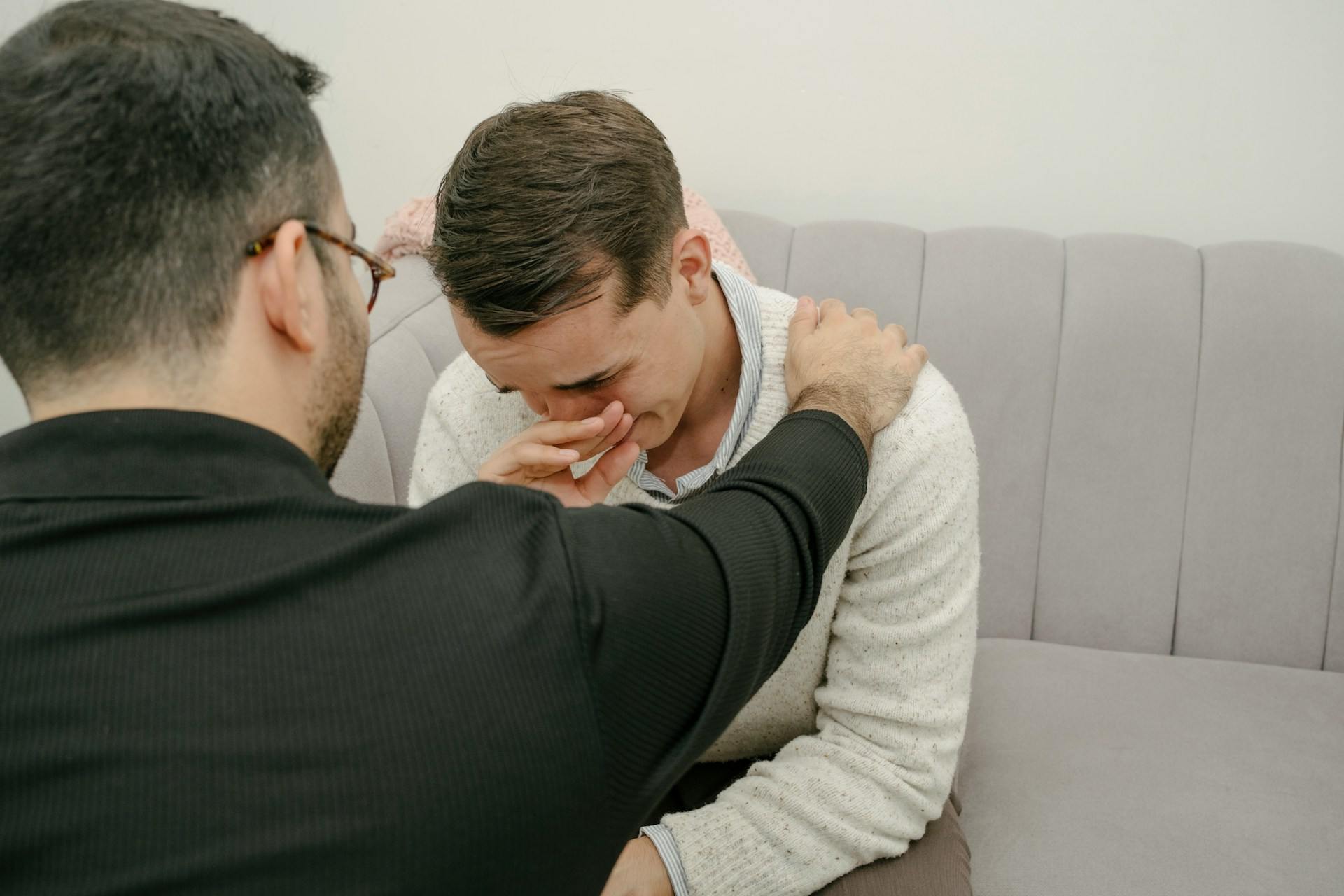Life is better when it is lived with others. After all, we are relational beings at our core. When we encounter hardships, they are easier to bear up under when we have a community of support that stands with us through the storm. The encouragement and support of a community are invaluable to the process of healing.
 No one wants to feel alone during a crisis, and yet “I feel so alone in this” is a thought that many of us have had during a particularly hard season of life. There are certain issues about which we may feel shame and discomfort at letting other people know, such as addictions or sexual abuse, and those emotions only compound the feeling of isolation.
No one wants to feel alone during a crisis, and yet “I feel so alone in this” is a thought that many of us have had during a particularly hard season of life. There are certain issues about which we may feel shame and discomfort at letting other people know, such as addictions or sexual abuse, and those emotions only compound the feeling of isolation.
If you are battling alone, or are only familiar with individual counseling, then group counseling may be an alternative to consider. Depending on the nature of the issue you face, group therapy may be the ideal choice to explore your concerns and bring about positive and lasting change to your life.
Facing life’s challenges alone makes the journey that much more difficult, and knowing that others understand and share your struggle, others who have gone through it and have come out the other side, others who are willing to support you on your own journey, makes all the difference in the world and might be just what you need.
As Ecclesiastes 4:9-12 says, “Two are better than one because they have a good return for their work: if one falls down, his friend can help him up…Though one may be overpowered, two can defend themselves. A cord of three strands is not quickly broken.”
Instead of feeling isolated in your struggle, Christian group counseling gives you a community and circle of support made up of like-minded brothers and sisters to walk alongside you on your journey of healing. Having other people who are on a similar journey to connect with and lean on and who will spur you on helps in the healing process.
What is Group Therapy?
What is group therapy though, and how does it work? When most people picture “counseling,” the most common picture that comes to mind is that of one-to-one counseling – the client lying on a couch for a private session with their therapist, for example.
 In group therapy, one or more skilled counselors lead sessions which typically include anywhere from four to nine individuals (and sometimes more), using appropriate group therapy techniques to guide members towards a better understanding of the issues they face.
In group therapy, one or more skilled counselors lead sessions which typically include anywhere from four to nine individuals (and sometimes more), using appropriate group therapy techniques to guide members towards a better understanding of the issues they face.
The group meets once or twice a week for an hour or two. The group may meet short-term (for a few months) or long-term (a few years). In the session, all members interact by listening to each other as they share their experiences and goals, and by expressing their thoughts and feelings.
Going to group therapy does not mean that you can’t also go for individual counseling. Some people choose to only attend group therapy, while others attend group therapy with additional individual sessions as well.
Whether you choose to do group therapy exclusively or not, the group space is a safe one, which allows for honesty and provides opportunities for accountability, practicing vulnerability, and developing tools to handle negative emotions and overcome the symptoms related to the focus area of the group.
Groups are designed around a focus area. These issues may include:
- Anxiety
- Anger
- Abuse
- Depression
- Divorce
- Trauma
- Shyness and loneliness
- Loss and grief
- Addiction
- Couples issues
Benefits of Group Counseling
Some people are very private, and so the thought of joining a group of strangers to share intimate details about parts of their life can seem downright intimidating and uncomfortable. However, the group experience can be extremely rewarding.
 One of the benefits of group counseling is that a trained therapist leads the group. These therapists usually have specialized training in dealing with the issue of central concern to the group.
One of the benefits of group counseling is that a trained therapist leads the group. These therapists usually have specialized training in dealing with the issue of central concern to the group.
So, if you’re attending a group for sex and pornography addiction, for example, your therapist will likely be a Certified Sexual Addiction Therapist (CSAT) who has the skills to treat unhealthy and unwanted sexual behaviors and thoughts. That means that they know how to manage specific problems and have the capacity to provide you with the means to achieve your goals.
The other huge benefit is that you’re on this journey with other members of the group. The group, itself, is a huge resource for you and your journey. A group can hold you accountable for achieving your goals. This will help you to move forward in the areas in which you want to make progress. Group therapy is especially helpful for teens, who are more open to listening to advice from their peers than from authority figures.
In the safe space of the group, the group can act as a sounding board for ideas when you are facing specific challenges. This is a network of support comprised of people who in many cases have literally “been there and done that.” They know your struggle because it is also their struggle.
The accumulated wisdom and experience within a group can be an invaluable resource for facing your challenges. Groups bring together people from all walks of life – being with others that aren’t like you, who don’t think like you do, and seeing how they approach and tackle their problems may provide you with new tools for engaging the situations and challenges you face.
Groups can also create a space to develop good, healthy relationships with others that share similar experiences to yours and that you communicate well with.
Being in a group also allows you to put your issues into perspective. Often, when we are left to ourselves and our thoughts, our problems can seem enormous and insurmountable. Bringing our problems out into the light, being able to say, “Hey, I struggle with that too! I thought I was alone” can be a huge relief. Hearing others’ stories of struggle and success can be an encouragement that your story may also turn out well.
Not only that, but group counseling also offers members an opportunity not only to receive from others but to give. While you may gain new perspectives from others and their experiences, God has given us all some wisdom to share with others, and group therapy provides you with an opportunity to share your story and inspire others.
How to Choose and Join a Group
 If you decide that you want to join a group, how would you go about it? What should you take into consideration as you make your decision?
If you decide that you want to join a group, how would you go about it? What should you take into consideration as you make your decision?
To find a group that suits your needs, you can ask your individual therapist (that is, if you have one) or you can consult your doctor. Alternatively, medical centers and local hospitals often sponsor several groups, so you can check with them as well.
Let’s say you’ve found a group and you think it could be a good fit for you. What sort of questions should you consider before joining it?
- How big is the group? For people with intense social anxieties, larger groups may be unhelpful and counterproductive. A smaller group allows members to get to know one another better and gives more time for each member to talk.
- Is the group open or closed? A closed group is one where the members all join at the same time and go through a 10 or 12-week cycle together, for instance. This can foster deep camaraderie as you journey together. An open group is one in which new people can join in at any time, and there may be a period of getting used to new dynamics as new members join.
- How much can I divulge? Confidentiality is a hallmark of therapy, but you must still exercise caution when sharing – some personal information, such as where you live, may not be wise to share. Additionally, consider that the first time you talk about something, it may be easier to do in a private session one-to-one with a therapist. You can choose to go to individual therapy first, and then group therapy.
- Is group therapy by itself enough? With help, you must decide if group therapy by itself will be enough. For some people it is. For others, with lots to talk about and who want a space to debrief the group therapy session, individual therapy in addition to the group therapy is also an option.
To start, consider finding out more about group therapy or booking an appointment. Walking alongside brothers and sisters in Christ with the same struggles may just be what you need. Group therapy is a place where you can begin your healing journey and achieve your goals for growth and positive change.
Photos:
“Yellow Bike on the Beach”, Courtesy of Ben Mater, Unsplash.com, CC0 License; “Field and Lake”, Courtesy of Sabine Ojeil, Unsplash.com, CC0 License; “Evergreen”, Courtesy of Yan L, Unsplash.com, CC0 License; “Fuzzy Leaves”, Courtesy of Yan L, Unsplash.com, CC0 License
-
Lisa Velin: Author
I’m a firm believer in the limitless possibilities for redemption through faith in Christ. I’m a Licensed Mental Health Counselor and Clinical Supervisor with extensive experience in bilingual counseling, and helping people work through anxiety, depr...
-
Kate Motaung: Curator
Kate Motaung is the Senior Writer, Editor, and Content Manager for a multi-state company. She is the author of several books including Letters to Grief, 101 Prayers for Comfort in Difficult Times, and A Place to Land: A Story of Longing and Belonging...
DISCLAIMER: THIS ARTICLE DOES NOT PROVIDE MEDICAL ADVICE
Articles are intended for informational purposes only and do not constitute medical advice; the content is not intended to be a substitute for professional medical advice, diagnosis, or treatment. All opinions expressed by authors and quoted sources are their own and do not necessarily reflect the opinions of the editors, publishers or editorial boards of Stone Oak Christian Counseling. This website does not recommend or endorse any specific tests, physicians, products, procedures, opinions, or other information that may be mentioned on the Site. Reliance on any information provided by this website is solely at your own risk.







